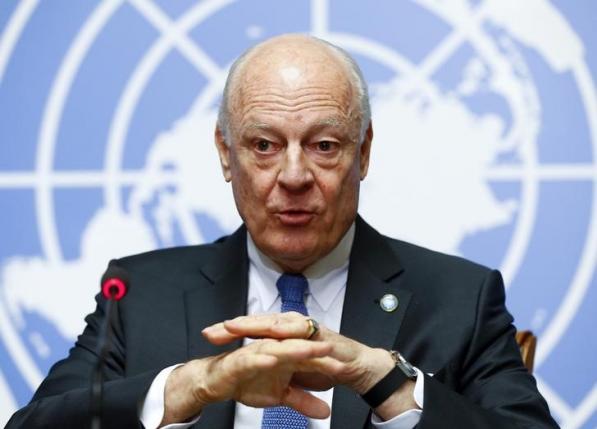
U.N. mediator for Syria Staffan de Mistura speaks to media on the U.N. sponsored Syria peace talks in Geneva, Switzerland March 14, 2016. REUTERS/Ruben Sprich
A U.N. mediator resumed peace talks between the government and the opposition on Monday warning that there was no “Plan B” other than returning to war if the first of three rounds of talks which aim to agree a “clear roadmap” for Syria fail to move ahead.
“As far as I know, the only plan B available is return to war — and to even worse war than we had so far”, Staffan de Mistura said.
He described political transition in the country now led by President Bashar Assad as “the mother of all issues.”
Moments before meeting with a Syrian government envoy, de Mistura laid out both high stakes and low expectations for the talks.
Syria faces a moment of truth, Staffan de Mistura said when he opened talks to end a five-year war which has killed at least a quarter of a million people, displaced half the population, sent refugees flooding into Europe and turned Syria into a battlefield for foreign forces and jihadis.
The talks are the most promising initiative in more than two years and come amid a marked reduction in fighting after last month’s “cessation of hostilities”, sponsored by Washington and Moscow and accepted by President Bashar al-Assad’s government and many of his opponents.
But the limited truce, which excludes the powerful ISIS and Nusra Front groups, is fragile. Both sides have accused each other of multiple violations, and they arrived in Geneva with what look like irreconcilable agendas.
The Syrian opposition insists that the talks must focus on setting up a transitional governing body with full executive power, and that Assad must leave power at the start of the transition.
Nevertheless, the two sides are deeply split on Assad’s future. His foreign minister, Walid al-Moallem, said Saturday that any talk of removing Assad during a transitional period sought by the U.N. was “a red line,” and ruled out the international call for a presidential election to be held within 18 months — a key demand of the opposition.
The talks began Monday with de Mistura hosting a government delegation led by Syria’s U.N. ambassador, Bashar Ja’afari. Speaking to reporters afterward, Ja’afari described his first meeting with de Mistura on Monday as positive and constructive, adding he submitted a document entitled “Basic Elements for a Political Solution”. He said the opposition will meet de Mistura on Tuesday, and his delegation would meet again on Wednesday.
Ja’afari says his team wants “to negotiate as Syrians under Syrian leadership without foreign intervention and without preconditions,” and said any side that opposed this point is “trying to sabotage this round.” He was referring to opposition demands from the previous round including an end to bombardment, release of detainees and the lifting of the siege by government troops on opposition-held areas.
De Mistura is meeting the two sides separately – at least initially in what he described as a preparatory session, ahead of a further meeting on Wednesday which would focus on core issues.
The talks must focus on political transition, which is the “mother of all issues”, the U.N. envoy said before his talks with Ja’afari. Separate groups would keep tackling humanitarian issues and the cessation of hostilities.
For the new phase, de Mistura said achieving successful talks lies also within the hands of the U.N. Security Council and the International Syria Support Group of 18 regional states and world powers — especially the U.S. and Russia. The two countries have led the process and brokered a deal that paved the way for the cessation of hostilities two weeks ago.
“The real peace-makers here are the peace-making powers who wanted these talks — the ISSG and the Security Council members — and hopefully the Syrian sides,” de Mistura said. If there doesn’t appear to be willingness to negotiate during these and future talks, “we will bring the issue back to those who have influence,” he said.
The opposition is holding out little hope that Geneva will help them in achieving its goal which is toppling Assad. It expressed its reservations on the government’s plans and on Washington’s stance softening against the Syrian president after shifting toward fighting ISIS.
The first round of talks are scheduled to run until around March 24, followed by a break of 7-10 days, then a second round of at least two weeks before another recess and a third round.
“By then we believe we should have at least a clear roadmap,” de Mistura said. “I’m not saying agreement, but a clear roadmap because that’s what Syria is expecting from all of us.”
